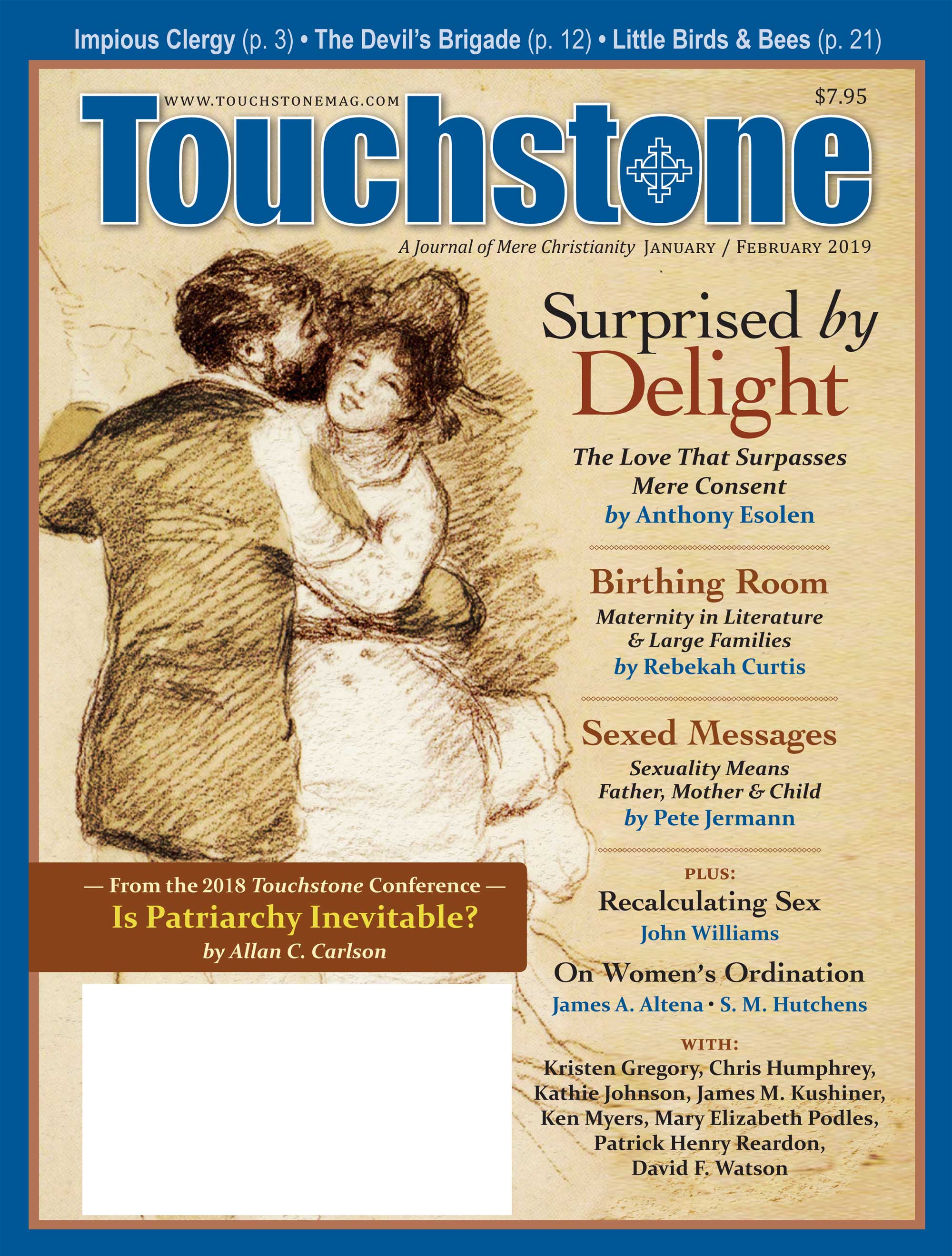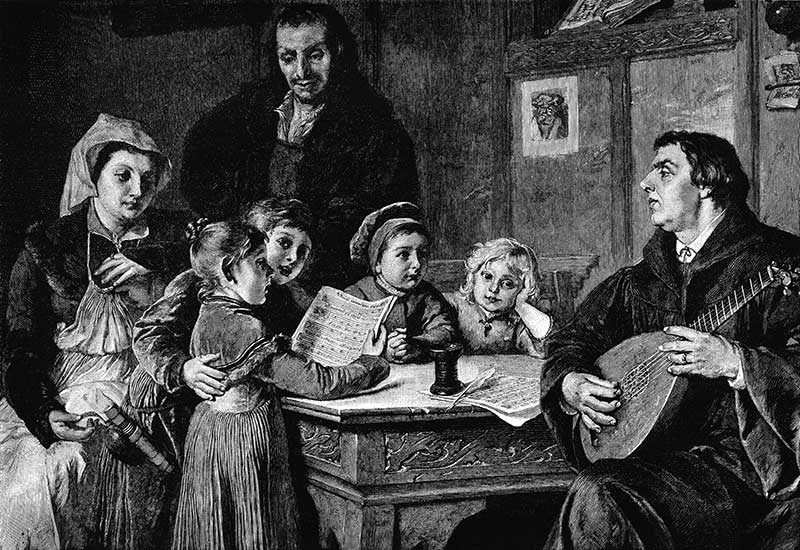Feature
Birthing Room
Maternity in Literature & Our Need to Find Better Words for Large Families
by Rebekah Curtis
Conventional wisdom knows of two types of big families: the trainwrecks, and the weirdos. The trainwrecks are easy to spot by their smudgy spawn, balding mommas, and lawns twinkling with bicycle fragments. The weirdos need not appear outright antisocial, except to the extent that those who outperform others are irksome. A crowd of homeschooled siblings exchanging bon mots in old Slavonic is all the proof we need that having more than two kids is not for normal people.
Fecundity is a normal mark of religions because religion is inherently hopeful, and so is procreation. Although Christians have faced controversies to the point of schism since Galatians 2, procreation as a positive good was a rare point of catholic consensus until the first part of the twentieth century. This is not to say that the propagation of the species was easy before 1930. In fact, the developed world is the richest, safest environment into which mothers have ever brought forth children. Our comparatively excellent situation is the one reasonable people find too dangerous and expensive for reproduction. Adherents of historically natalist religions are only slightly more likely to have more than 2.1 children.
This sea change in Christian thought has marooned those who hesitate to accept the novel practice of default contraceptive use. Such people are left without guidance and help largely because they are without sympathy. Their experience and beliefs are so far removed from conventional thinking that their willingness to receive children cuts them off from their own families and churches.
Since discussions of family planning contort rapidly into hurt feelings, an impersonal frame of reference is needed to help us set our thinking straight. Literature depersonalizes the procreation question, while illustrating large-family difficulties beyond shortages of drumsticks. But we will have to dig a bit to find it. Rivka Galchen's 2016 reflection on maternity, Little Labors, includes a section titled "Literature includes more dogs than babies."
It is true that classic literature tends to skip over pregnancies and early childhoods. Characters and their mothers are added back into stories after the years of nursing and nappies, or the author employs narrative contraception to keep a valuable character from being lost to career maternity. A person who has put in such years understands why. Their monotony is so momentous as to become a consuming plot of its own, and not every novel has room. Remove the limit to such years that contraception provides, and the entire narrative (or at least a caregiving mother character) is hijacked.
Although the Western canon of literature specializes in war, betrothals, and public and personal politics, the exclusion of babies should not be overstated. The plot that menaces all others has received expert treatment from Elizabeth von Arnim, Vilhelm Moberg, and Enid Bagnold. Arnim is a pessimist, Moberg is a realist, and Bagnold is an optimist in showing the inner lives of couples whose measure of children runneth over. Whether these families are also shaken together or pressed down is the reader's privilege to discover.
The Dremmels & the Nilssons
Elizabeth von Arnim was a mistress of H. G. Wells, and a master of backhandedly incisive writing. Her 1914 novel The Pastor's Wife tells the story of Ingeborg, an Anglican bishop's daughter, who is pursued to the altar by Herr Dremmel, a twitterpated Lutheran worker-priest. Having achieved his aim, Dremmel takes Ingeborg to Prussia, where he recovers his ethnic taciturnity, and she has mostly cheerful days until becoming pregnant.
Here the author forgoes the expected plot for the less-traveled one, and documents the pregnancy. Arnim takes the reader through dragging months of sickness, distention, and fear. Ingeborg suffers excruciating conversations with veterans of her condition. She and Dremmel have hard talks about chloroform and doctors, topics on which both feel strongly: his wish to dismiss feminine medical novelties is as great as hers to embrace them. The child is born without detail, but Ingeborg fails to arrive at the expected Mutterglück. Arnim then portrays the most realistic onset and course of mastitis in literary fiction.
Many more Dremmels are generated amid the perils of early twentieth-century Prussia. Finally, Ingeborg hies to a doctor, who declares to Dremmel that Ingeborg's health renders additional pregnancies ausgeschlossen (excluded). The doctor's suggestion for coping (spoken just out of the reader's hearing) offends Dremmel. The already threadbare marriage reaches the limit then available to Christians.
To the conventionally wise, The Pastor's Wife exposes exactly what was wrong with the old way. By contrast, practitioners of the church's catholic teaching on procreation might find the novel downright unsettling. Couples who are bound by conscience to receive the fruits of their union as the Lord grants them may feel that the Dremmels' problems are neither obscure nor dated, but too close for comfort.
Another literary representation of life without contraception is played out in Vilhelm Moberg's four-book Emigrants series (published 1949–1959; set 1850ff). The first book opens with the problem that, while serving the family farm, the offspring have also outgrown it. Parceled down the generations past usefulness, the rocky Swedish ground cannot support Karl Oskar Nilsson and his family. Want and tragedy drive them to America.
Throughout the series, Karl Oskar and his wife Kristina have a loving and unromantic relationship. Kristina lives in constant turmoil over her state of pregnancy or potential pregnancy, and fecundity is almost as significant a character in the Nilssons' lives as their children are. When Kristina finally receives a diagnosis similar to Arnim's Ingeborg, things cannot go much better than they do for the Dremmels. America is not Prussia and Karl Oskar is not Herr Dremmel, so the outcomes are different, but neither is sunny. The reader's comfort is that fictional people do not have a claim upon true
empathy.
Measuring Up
Things have changed since Arnim and Moberg's fictions. The infamous Resolution 15 of the Anglican Church's 1930 Lambeth Conference dealt with the brokenness of human procreation this way:
[I]n those cases where there is such a clearly felt moral obligation to limit or avoid parenthood, and where there is a morally sound reason for avoiding complete abstinence, the Conference agrees that other methods may be used, provided that this is done in the light of the same Christian principles. The Conference records its strong condemnation of the use of any methods of conception control from motives of selfishness, luxury, or mere convenience.
Pope Paul VI addressed the same question in his 1968 Encyclical Humanae Vitae:
[W]ould it not be right to review the moral norms in force till now, especially when it is felt that these can be observed only with the gravest difficulty, sometimes only by heroic effort? . . . Responsible parenthood is exercised . . . by those who, for serious reasons and with due respect to moral precepts, decide not to have additional children for either a certain or an indefinite period of time. . . .
Lambeth offers no formal definitions or examples of selfishness, luxury, or convenience; neither does Humanae Vitae specify which reasons are serious enough to limit family size by means of the moral precepts outlined in the encyclical (that is, abstinence during a wife's fertile periods). Lacking explicit guidance or like-minded neighbors, those seeking to order their sexual ethic according to Scripture and catholicity turn to what can be known of the experiences of ancestral Christians. One can hardly envision Gisela of Hungary googling Creighton NFP because she wasn't sure she and King St. Stephen could cover a data plan for another child. Samuel and Susanna Wesley lost nearly half of their 19 children; their joint Reddit post making a compassionate case for contraception is not extant.
But those are caricatures from silence, and it also is not true that general statements from sees and synods leave the flock untended. Casuistry belongs to pastors and parishioners on the daily plain where each Christian works out his salvation with fear and trembling. Deciding to have more children, though, is only the beginning. The trainwreck/weirdo schema leaves big families without social support or practical help: the trainwrecks are beyond it, and the weirdos don't need it. It's little wonder that having more than two children seems unappealing.
Also of little wonder is the church's struggle to reconcile divine wisdom with the conventional kind. In the Roman Church, discussions of conjugal integrity are often shunted into "how-to" sessions on Natural Family Planning. This invites the criticism that NFP is simply Catholic contraception. This attempt to deal with the secularized mind gives the impression that a heart will only change by bait-and-switch. Alternatively, among natalist Evangelicals, "providentialism" is a prevailing ideal (with the Duggar family as poster children, conveniently embodying both weirdos and trainwrecks). The "as many babies as possible" way of thinking ultimately drives out the same kind of people who left their churches after failing to live up to anti-rock-music pledges. Rome appears disingenuous to Evangelicals, Evangelicals appear cruel and/or stupid to Rome, and both appear insane to the public.
The Rest of the Story
Where does this leave the Dremmels, the Nilssons, and real contemporary couples trying to find the Christian way through the sixth commandment? Novelist Enid -Bagnold offers a final literary case study. Bagnold is famous as the author of National Velvet, rather than as a mother of four. But during her pregnancies and recoveries, she took extensive notes for the purpose of writing a definitive novel on the maternal experience. Her 1938 novel The Squire portrays the final days of a pregnancy, the birth of the child, the mother's recovery, and the family's daily life throughout. The mother's thoughts swivel between the transcendent and the mundane as often as they must in the presence of a newborn learning to nurse. The juxtaposition is a pitch-perfect transcription of a mother's inner life, heightened (as it always is) by the immediate circumstance of birth.
Bagnold's fictional mother is known simply as the Squire, since the father of the story is away for the duration of the book's events. The Squire is a veteran, welcoming her fifth child at the age of 42—truly welcoming. She is content and eager. She knows well the pain she will face, and believes that this time she has learned to be its master. She wants to be around her other children, reveling in the marvelous depths of human mystery represented in each. Middle age and motherhood have freed her from the anxiety she sees in a young neighbor lady who visits. She is interrupted by quotidian annoyances, and retreats when she may to the comforting knowledge that her life is one of magnificent accomplishment.
The Squire is frank and wry. The introduction to -Virago Press's 1987 edition included H. G. Wells' response to the book: "I'd been attacked by a multitude of many breasted women (like Diana of Ephesus) and thrown into a washing basket full of used nursery napkins." This may be Mr. Wells's most unwitting work of futurism, foretelling the experience of countless fathers who now function as postpartum doulas. But Bagnold is owed a debt of gratitude for her presentation of what it looks like when a circumspect woman has many children, and finds in that work satisfaction framed upon intellect. This story is rarely told in depth, without sentimentalism.
It is easy to bewail the low esteem in which motherhood is held, but Bagnoldshows the other side of the life angled at by Arnim and Moberg. In the time and space around the delivery room, there is no believing that childbearing is merely a sidebar to real life. To couples who hazard to receive whomever the Lord might bring to life between them, the low regard of neighbors should carry all the significance of a toddler's tantrum. Likewise, many reasons given for dodging the risk make as much sense as a toddler's joke.
Explain Everything in the Kindest Way
The question is how to help Christian couples arrive at a place more like the one Bagnold describes than those imagined by Arnim and Moberg. Externals matter: families with significant problems are badly served if the only treatment they receive is dogmatic pressure either to stop or to keep having children. These are the situations calling for attentive pastoral counsel. The plurality of couples who enjoy good health, a reliable marriage, and adequate daily bread are those situated to hear that where God gives children in abundance, he shows a grace so vast that no response suffices but receptive thanksgiving.
But even these couples will find that conjugal integrity comes with unique hardships. Many Christians who agree that children are a blessing believe themselves to be assenting to proverb and not promise, so understanding of the catholic position is rare. We are also deficient in good examples. Few families of anyone's acquaintance are big, and many difficulties encountered along the path toward bigness are not easily discussed. The missteps of the Dremmels, the sublime love of the Nilssons, and the extraordinary wisdom of the Squire offer a needed reorientation of worldview without any harm to our fellow pilgrims. These imaginary friends can be an initial force toward a social trajectory of charity.
Another way to begin helping neighbors keep the sixth commandment is by keeping the eighth. Speaking ill of children is an illness we have contracted from the children of wrath. Martin Luther's explanation of the eighth commandment calls us to defend and speak well of our neighbors, and "explain everything in the kindest way." Trainwrecks and weirdos are our neighbors no less than the couple newly married, newly pregnant, newly reflective, or newly repentant. Familiarity with a filling quiver's typical trials awakens the sympathy that enables us to defend and speak well of those being tried. If we are able to find better words for big families, we will be better able find those families no more weird or wrecked than ourselves. Least of all will we find them irredeemable, and the grounds of redemption are the natural commons of all God's children.
Rebekah Curtis is the co-author of LadyLike (Concordia, 2015), and her essays have appeared in Touchstone, Chronicles, Salvo, Modern Reformation, and Lutheran Forum, among other publications. She attends a congregation of the LCMS.
subscription options
Order
Print/Online Subscription

Get six issues (one year) of Touchstone PLUS full online access including pdf downloads for only $39.95. That's only $3.34 per month!
Order
Online Only
Subscription

Get a one-year full-access subscription to the Touchstone online archives for only $19.95. That's only $1.66 per month!
bulk subscriptions
Order Touchstone subscriptions in bulk and save $10 per sub! Each subscription includes 6 issues of Touchstone plus full online access to touchstonemag.com—including archives, videos, and pdf downloads of recent issues for only $29.95 each! Great for churches or study groups.
Transactions will be processed on a secure server.
more on family from the online archives
more from the online archives
calling all readers
Please Donate
"There are magazines worth reading but few worth saving . . . Touchstone is just such a magazine."
—Alice von Hildebrand
"Here we do not concede one square millimeter of territory to falsehood, folly, contemporary sentimentality, or fashion. We speak the truth, and let God be our judge. . . . Touchstone is the one committedly Christian conservative journal."
—Anthony Esolen, Touchstone senior editor













